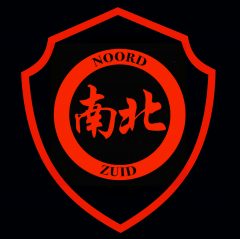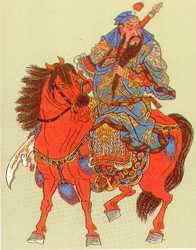 Guan Gong (Lord Guan): a reverent term of address for Guan Yu (160 – 219) later deified as Guandi. On the picture seen riding his horse Red Hare. He had a huge frame, long beard, dark brown face and deep red lips. “He had eyes like a phoenix and fine bushy eyebrows like silkworms. His whole appearance was dignified and awe-inspiring.”
Guan Gong (Lord Guan): a reverent term of address for Guan Yu (160 – 219) later deified as Guandi. On the picture seen riding his horse Red Hare. He had a huge frame, long beard, dark brown face and deep red lips. “He had eyes like a phoenix and fine bushy eyebrows like silkworms. His whole appearance was dignified and awe-inspiring.”
“Gong” means lord, an honorary title, while “Guan” is his surname. Therefore Guan Gong means “Lord Guan”. His actual name was Guan Yu. This is the name with which he began his military career.
Although there are many legends attached to Lord Guan, he is not a mythological figure, but an actual person from history. He lived in the period of the Three Kingdoms, a time of civil strife and chivalry seventeen hundred years ago.
Lord Guan was born in Xiexian, Shanxi Province in 160 CE. At age 19, he killed an oppressive official and freed his victims. Despite his just cause, he became a fugitive for the half decade following. While on the run, he took refuge in a Taoist Temple. There, a Taoist sorceress told him to wash his face in a spring. The water turned his face a distinctive red, disguising him from his persecutors. Others say it is a manifestation of his righteous anger. We know of Lord Guan’s exploits primarily through the historical novel ‘Sanguo Yenyi’, known in the English-speaking world as ‘The Three Kingdoms’ written by Luo Guanzhong in the 14th century. It romantically recounts the tumultuous period during the fall of the Han Dynasty (206 BCE – 220 CE) and the successive Three Kingdoms period (220-265.)
The virtues Guan Gong personifies – honor, loyalty, integrity, justice, courage, and strength – are ideals that can really impact us. In the West, the few who know Lord Guan sometimes call him the Taoist God of War. This idea comes from the fact that Lord Guan is easily the most famous general from Chinese history. In battles he invariably dominated the field as the most powerful, most skillful and most courageous warrior, as well as an able leader and tactician.
For the Chinese people, Lord Guan is the god of martial arts, wealth and literature. He is one of the most dominant deities of Chinese and Tibetan beliefs, honored in altars within homes, businesses and schools around the world. Here, his deep impact upon kungfu is exemplified by the practice of Guan Dao.
Lord Guan served with Zhang Fei, another great warrior, under Liu Bei, one of the foremost leaders in the Three Kingdoms period. While a bandit gang called the Yellow Scarves was terrorizing the countryside, the three met over drinks and discovered their mutual aspirations for justice. Since the peach garden behind Zhang Fei’s farm was in full bloom, the three performed ritual prostrations there to bind them as sworn brothers. They pledged to combine their powers together to protect the common folk, to be filial to the Emperor and to die on the same day. To the Chinese people, this peach garden oath symbolizes the essence of honor and loyalty, and is retold again and again with great reverence. Today, kungfu practitioners remember the sworn brothers during Lion dances. The three traditional lion heads pay homage to the brothers. Each of them had a weapon made after they swore the oath.
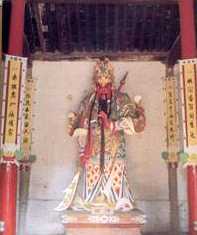 Guan Dao at Guanlin temple in Luoyang, Henan province. Liu Bei had the finest smith forge for him a pair of matching double edged swords; for Lord Guan a Green Dragon cresent-moon blade, also known as Frozen Glory, weighing eightytwo jin, and for Zhang Fei, an eighteen span spear of tempered steel. He also ordered a full body armour for the four of them.One jin equals to 500 gram. During the process of welding and cooling, a wavy damascene pattern may appear on the metal surface of a sword blade; just as if it is frozen (hence the name frozen glory). Lord Guan’s sword is charged with solar (yang) energy; Green Dragon is the name of the astern quadrant of the sky, from which the natural forces of renewal come each day.
Guan Dao at Guanlin temple in Luoyang, Henan province. Liu Bei had the finest smith forge for him a pair of matching double edged swords; for Lord Guan a Green Dragon cresent-moon blade, also known as Frozen Glory, weighing eightytwo jin, and for Zhang Fei, an eighteen span spear of tempered steel. He also ordered a full body armour for the four of them.One jin equals to 500 gram. During the process of welding and cooling, a wavy damascene pattern may appear on the metal surface of a sword blade; just as if it is frozen (hence the name frozen glory). Lord Guan’s sword is charged with solar (yang) energy; Green Dragon is the name of the astern quadrant of the sky, from which the natural forces of renewal come each day.
The Guan Dao itself had powers besides beheading. Once General Kwan and his followers were caught without water. Lord Guan thrust his Guan Dao into the ground and a fresh spring came bubbling up. That place was named Zhoudao Spring and the temple to Lord Guan was erected to commemorate that event. It still welcomes pilgrims today.
To outsiders, the Kwan Dao seems impractical and obsolete. Not only is it too heavy to be practical (although some might argue that this is kungfu weight training) it is useless for self-defense. It is not the type of thing you would have handy when attacked by a mugger on the street. But true Kwan Dao practitioners are after something far greater than the conventional benefits of health and self-defense. They are seeking “Wu De” (ÎäµÂ) – the kungfu warrior’s code. While we train to be healthy and lethal, the ultimate intention is to protect the good from evil. We follow the example of inspirational warriors such as Lord Guan. Another name for this weapon is Spring-Autumn Halberd (Chunqiu Dadao). It bears this name because of the fact that General Guan Gong read the Spring-Autumn Annals when he wasn’t fighting on the battle field.
Lord Guan is the epitome of a martial arts hero. Brave, powerful and honorable, he represents all that warriors hold true. Not only is he righteous, he wields his weighty weapon with deadly head-chopping accuracy. And he loved to fight. Within the very first chapter of The Three Kingdoms, Lord Guan already draws first blood. When the sworn brothers go after the Yellow Scarf Bandits, Kwan goes right for their chieftain, Cheng Yuanzhi. With a single blow of his heavy Guan Dao, he the bandit chief in two.
Bandit Cheng would be just one of the many evildoers to fall to the General’s blade. Throughout The Three Kingdoms, Lord Guan leaves a bloody trail of villains in his wake. In one memorable episode, when Lord Guan was still a mere archer in the ranks of Commander Cao Cao, another pivotal figure from that historical epoch.
Cao Cao admired Lord Guan’s abilities and principles and wished to recruit him for his own cause, but Lord Guan remained steadfastly loyal to Liu Bei. Lord Guan went up against a dreaded warrior named Hua Xiong of Guanxi.
Hua was as tall as Lord Guan , with a body like a tiger, supple like a wolf, a panther-like head and the arms of an ape. Several of Cao Cao’s top fighters had already fallen to Hua’s sword. Speaking out of turn, Lord Guan offered Hua’s head to Cao Cao, saying, “If I fail, my head is yours.” The assembly of lords scoffed at the low ranking soldier, but Cao Cao was impressed with Guan’s bravado and heated some wine for him. Lord Guan told him to pour it and set it aside for him, then grabbed his Guan and leapt on his horse. Lord Guan rode alone, straight into the enemy’s lines, amidst the battle cries and war drums of Hua’s troops. Just when the terrible noise of war grew so loud that the very heavens would split, Guan rode back to Cao Cao’s encampment. He tossed Hua’s freshly chopped head to the ground. And his wine was still warm.
Once Lord Guan participated in the famous battle known as “Three heroes battle Lu Bu”. After the battle against Cao Cao in Xu Zhou, the three sworn brothers became divided. Lord Guan was protecting Liu Bei’s wife with only his small army against Cao Cao’s great army without having any knowledge of Liu Bei and Zhang Fei’s location. Cao Cao greatly admired Lord Guan for his bravery and loyalty. He sent his general Zhang Liao who was an old friend of Lord Guan’s to try to persuade him to join Cao Cao. Lord Guan knew that he could not protect Liu Bei’s wife safely because of his small army. So he made three agreements with Cao Cao. The first was that he would only surrender to the Emperor as Cao Cao was still the Prime Minister at that time. The second was that Cao Cao would not harm Liu Bei’s wife, and third was once he found out where Liu Bei was, he would go join him. Cao Cao agreed to the first two but didn’t agree to the third one, but after listening to his advisors’ ideas to getrid of Liu Bei, he decided to agree.
During his time in Cao Cao’s camp, Cao Cao presented him with many gifts, but Lord Guan returned them all when he left to rejoin Liu Bei. Then Cao Cao gave him a war vest, but Guan Yu wore the new vest under his old one which Liu Bei gave him.
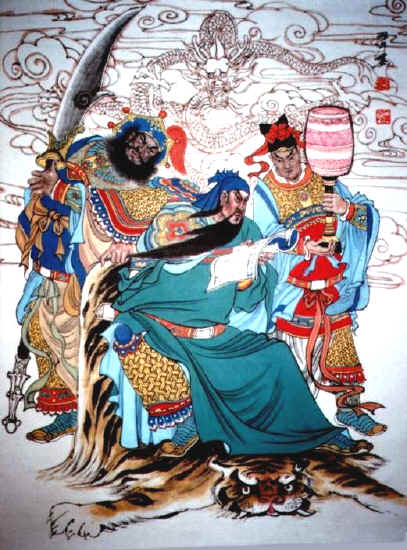 (Another aspect of Guan Gong that is bo admired is that he valued intangibles – sentiments, friendship, fidelity, brotherhood – far above tangible material things.) Cao Cao was furious at that time and sent Zhang Liao to persuade him to forget about Liu Bei. After their conversation Zhang Liao told Cao Cao that if Liu Bei ever died, Lord Guan would also suicide to follow his “Peach Garden” oath, but he would not leave Cao Cao until he did something in return.
(Another aspect of Guan Gong that is bo admired is that he valued intangibles – sentiments, friendship, fidelity, brotherhood – far above tangible material things.) Cao Cao was furious at that time and sent Zhang Liao to persuade him to forget about Liu Bei. After their conversation Zhang Liao told Cao Cao that if Liu Bei ever died, Lord Guan would also suicide to follow his “Peach Garden” oath, but he would not leave Cao Cao until he did something in return.
A short time later, Yuan Shao ordered one of his top generals Yan Liang to command his troops to attack Cao Cao. Yan Liang was a very fierce warrior, none of Cao Cao’s available generals could defeat him. Cao Cao quickly sent a letter informing Lord Guan to go to the battlefield. Lord Guan easily defeated Yan Liang. In Yuan Shao’s capital, the news arrived stating that Lord Guan had defeated Yan Liang. Liu Bei joined Yuan Shao after he becameseparated from Lord Guan and Zhang Fei. Yuan Shao believed Liu Bei to be Cao Cao’s infiltrator so he ordered Liu Bei to be executed. However, Liu Bei was successful in persuading Yuan Shao that it might be Cao Cao’s scheme to use someone that looks like Lord Guan to kill Yan Liang to sow discord between Liu Bei and Yuan Shao.
Then Wen Chou, another of Yuan Shao’s top generals and sworn brother to Yan Liang was ordered to attack Cao Cao with Liu Bei’s help. Again Cao Cao had to use Lord Guan in order to defeat Wen Chou. Wen Chou’s army quickly retreated, but Liu Bei managed to catch a glimpse Lord Guan before retreating. After confirming Lord Guan’s involvement, Yuan Shao threatened Liu Bei again, but Liu Bei assured Yuan Shao that if Lord Guan was involved, he could persuade Lord Guan to join them. Yuan Shao was overjoyed upon hearing this. After receiving Liu Bei’s letter, Lord Guan quickly informed Liu Bei’s wife and they set out to rejoin Liu Bei. Cao Cao heard the news that Lord Guan was leaving and went to bid him farewell at a bridge. Cao Cao respected him so much that he decided to let him go. Lord Guan continued his journey and ran into trouble at the first fort he reached. The commanding general did not want to let him through because Lord Guan did not have a pass from Cao Cao. So Lord Guan was forced to kill him. He passed through a total of five forts and killed six generals without resting. He became well known from that incident, which became known as “Passing five obstacles, killing six generals”.
Many years passed and Lord Guan was in charge of defending an important territory, Jing Zhou. Cao Cao and Sun Quan allied and launched a joint invasion attacking the territory which Guan Yu had been defending. Guan Yu was not able to defend that place and was captured by Sun Quan.
And so Lord Guan and his son, Ping, were beheaded in the twelfth month of the twenty-fourth year of Jian An (A.D. 220) Lord Guan was fifty-eight years of age.
A poet of latter times has left these line expressing his sorrow and admiration:
Unriveld in the latter years of Han,
Lord Guan towered high above all men.
Bold in arms by dint of godlike might,
He knew his letters in a scholar? right.
Like glare of day, his heart reflected true,
Hi Spring and Autumn honor touched the clouds –
A shining spirit to live through history,
Not just the crowning glory of a world in three.
Another verse says:
For the paragon of men, look back in Jieliang;
There men vie to honor Lord Guan of the Han.
For the peach grove brother oath he sealed one day,
A thousand autumns?tribute of royal rites.
His manly soul had power like wind or thunder:
His glowing purpose shone like sun or moon.
And now the realm abounds in statued shrines
With winter-braving crowns on olden boughs.
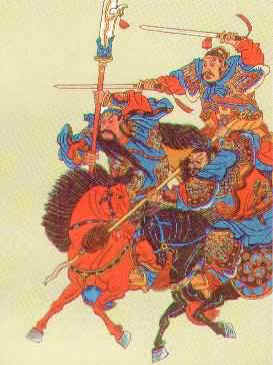
After the passing of Lord Guan, his glorious steed, Red Hare, captured by Ma Zhong, was presented to Sun Quan, who made Ma Zhong a gift of the horse. But Re Hare refused to eat and died after several days. Many loyal followers also died upon hearing news of his passing. His loyal weapon bearer, the dark-skinned Zhao Chang, cut his own throat in grief when he witnessed Lord Guan’s severed head.
The vapor from Lord Guan’s soul remained undissolved, floating attenuated until it came to rest on Jade Springs Hill in Dangyang county, Jingmenzhou. On the hill lived and old monk whose Buddhist name was Pujing, or Universal Purity. He had once saved Lord Guan long before. He was the abbot of Zhenguo Temple at the Si River pass. The night Lord Guan died, the moon glowed pale and a breese blew cool and fresh. Some time after the third watch, as the monk was sitting in meditation, a voice in the sky called out, “Return my head” Pujing scrutinized the air. A man was riding the steed Red Hare and brandishing the sword Green Dragon. Two men were in his train, a general of fair complexion and a swarthy man with curling whiskers.
Together the three alighted from a cloud onto the summit of Jade Springs Hill. Pujing realized that it was Lord Guan and struck the door with a deer-tail whisk for protection against the spirit. He said, “Lord Guan, where are you now” Lord Guan’s glowing cloudsoul seemed to comprehend instantly as it dismounted and dropped on the wind before the monk? hut. Palms together , the wraith spoke:”Who are you, master? I would know your name-in-Buddha.” “Yhis old monk is known as Pujing”, he replied.”We met once before at the Zhengguo Temple, my lord. Can you have forgotten?”
Replied Lord Guan: “My gratitude for the help you once gave is engraved in my memory. A calamity has befallen me, and I appeal to you now for the redeeming counsel that will point me out of the darkness of my wandering. “Right and wrong, past and present are relevant no more; retribution follows human action with the certainty of fate”, the monk answered. “How you cry out for your head, having meet your death at the hands of Lu Meng. From whom shall Yan Liang, Wen Chou, Cao Cao,the six passed guards, and the countless others you killed seek their heads” In a flash Lord Guan realized the truth and, bowing his head to Buddha’s law of Karma he departed. Thereafter he frequently manifested himself in divine form on Jade Springs Hill to afford protection to the common people. And the local dwellers showed their gratitude by building a temple on the summit (Yuquansi, Hubei Province), where they made offerings each season. To this day, another temple stands there in his honor.Later someone inscribed the following couplet on the temple wall:
Behind the ruddy face, a ruby heart-
Lord Guan astride Red Hare outrode the wind.
But far as he rode, he served the Fire King.
By oil lamp light he studied history;
In was he trusted to his dragon sword.
His inmost thought would welcome light of day.
To draw the wrath of Liu Bei, Sun delivered Guan’s head to Cao Cao. When Cao Cao received the box containing Kwan’s head, he opened it and said “General, I trust you have been well since we parted.” Instantly, Guan’s eyes glared back and his hair and beard shot out like porcupine quills. Cao Cao fainted. After being unconscious for a long period, Cao Cao had a body carved of sandalwood and gave Guan honorable burial in Guanlin Temple, near Luoyang and Shaolin Temple. This temple is also still active today and it boasts possession of the “original” Guan Dao as part of its treasures.
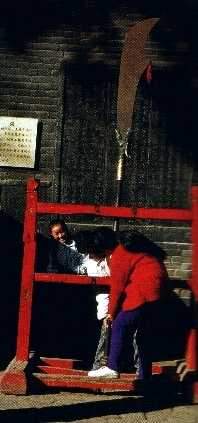
The “original” Kwan Dao at Guanlin Temple near Shaolin Image of Lord Guan at Guanlin Temple

